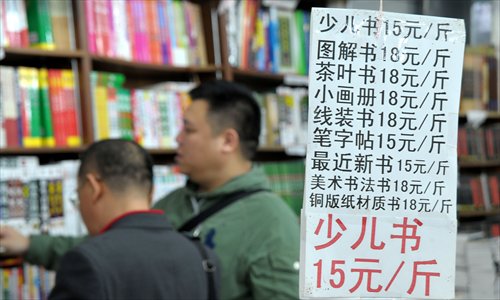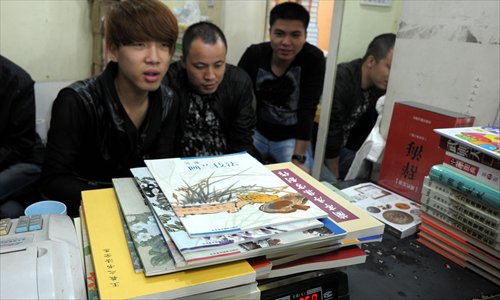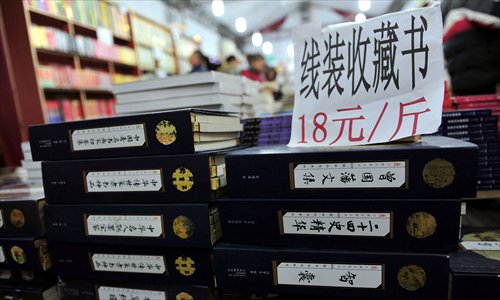Weighty tomes

Customers browse tables and shelves at a pay-by-weight bookstore on Fuzhou Road, with the posters reading "To be closed soon. Last days' sales." Photo: CFP
Shanghai often sets trends for the rest of the country but now there's a surprising new method of selling books that has upset authors and academics but been welcomed by consumers. According to a Youth Daily report more than 100 bookstores in Shanghai are now selling books not as individual titles but by weight. The trend has been spreading to neighboring provincial capitals like Hangzhou and Nanjing.
One leading bookstore in Fuzhou Road, the Shanghai street that is synonymous for books and culture, is now displaying a handmade poster at the entrance reading: "To be demolished soon. Books sold by the kilogram from 13.60 yuan ($2.20) a kilogram."
The wording suggests that this might be the last chance to get a bargain here but several observers on the popular culture website douban.com have pointed out this is probably just a marketing strategy. "The sign has been there for years - I saw it first around 2008," one user wrote.

The different prices for different categories of books are clearly set out in a bookstore. Photo: CFP
Costing the categories
In the bookstore to the left of the entrance is a large cashier's desk cluttered with books and an old-fashioned set of scales. The rest of the shop is stacked with bookshelves and thousands of books sorted into categories with each category priced at different rates.
Chinese coffee-table books and those with lots of photographs and illustrations attract the highest prices. Books listed as design and furniture books, or illustrated language learning books cost 36 yuan a kilogram.
Best-sellers also cost 36 yuan. A load of the novels and writings of the phenomenal Shanghai author of teen fiction and publisher of teen magazines, Guo Jingming, fills much of one large bookshelf in the shop.
Most of the categories sell for 30 yuan a kilogram. Tourism, biography and school essay writing guides fall into this price which is also what people pay for "new books" - though on display here were novels from the Twilight series and translations of Shakespeare (not exactly recent publications). Under the management and philosophy category sat writings by Schopenhauer next to textbooks on economics and game theory, and then a section for dictionaries and how-to books.
Classic literature (predominantly classic Chinese novels and essays) cost 26 yuan a kilogram and inspirational (mostly guides to achieving material fulfillment) and health and cooking books were sold for 22 yuan.
The foreign language section offers some English books at 60 yuan a kilogram, mostly travel guides and cookbooks.
A small anteroom held the real bargains however. Here crammed on shelves and even stacked on the floor could be found all manner of books which could be bought for 13.60 yuan a kilogram - just as the sign at the entrance promised.
A woman at the cashier's desk declined to give her name but said the cheap books in the back room were the oldest (not rarest) books in the shop. She said because the shop was offering books at the lowest price possible in the city there was no bargaining. "There is not one particular category of book that sells well these days," she told the Global Times.
In the shop 10 or so customers browsed slowly through the shelves looking for lightweight bargains. Only one eventually bought anything - 64-year-old Shanghai man Jiang Enqi placed two language learning books on the scales.

A young man has his book purchases weighed. Photo: CFP
A good idea
At about 800 grams, the two books cost Jiang nearly 29 yuan. In conventional bookstores, he said, just one book would cost as much, "They are for my 5-year-old granddaughter. Study materials for small kids are increasingly expensive these days and they are not something kids will read and consult over time, so I think it is a good idea to buy them here."
Books sold by weight are generally cheaper - even when the books are heavy and bulky. A 1,586-page Chinese-Japanese dictionary by the Foreign Language Teaching and Researching Press, for example, weighs about 1.5 kilograms and therefore costs around 45 yuan. In one State-owned bookstore on Fuzhou Road, the same dictionary was selling for 74.90 yuan. On amazon.cn it costs 55.90 yuan. On taobao.com, the country's most popular online shopping site, the prices started from 52.43 yuan.
But Sun Erwei, a 72-year-old former school teacher who had visited the bookstore a couple of times as well as other pay-by-weight shops, said she would never consider buying "serious books" like dictionaries there. She believed many of the books in these stores were pirated editions.
"I think quite a lot of these books are pirated, judging by the quality of the packaging, the paper, the print and the number of errors. If it is light popular fiction it is okay - I can figure out what the meaning should be from the context. But when it is a technical publication a single character can make a huge difference and people should be protected from this rather than buying in shops which have so many pirated books," Sun told the Global Times.
The Youth Daily report also mentioned out that pirated editions were rampant in this kind of bookstore and they accounted for at least 20 percent of the books on sale. One shop on Longyang Road in Pudong New Area, for example, also sold books that were never authorized like the "autobiography" of Yang Lan, one of China's most popular television hosts.
The Global Times visited this bookstore on March 8 and the owner, a 40-something man surnamed Zhang, said he had no idea whether or not there were pirated books in his shop. "They are among the remaindered books we purchase from the dealers," he said.

These collated volumes are on offer for bargain prices. Photo: CFP
A helping hand
Remainders are the unsold books that remain with a publisher or a bookstore and have to be disposed of. "If it weren't for bookstores like mine, these leftovers would end up being sold by weight as well - but just for the weight of the paper, maybe for 0.80 yuan a kilogram," Zhang said. This was echoed by the shop assistant at the Fuzhou Road bookstore, who said the shop was "offering publishers and bookstores a helping hand."
The Youth Daily noted that these remainders were usually sold to these bookstores at a 90 percent discount on the original price and some were sold with a 95 percent cut.
At Zhang's store, these books get priced, without being divided into categories as they are at Fuzhou Road bookshop, at 36 yuan a kilogram. The only exceptions are art books, which fetch 40 yuan a kilogram.
The profit margins in these bookstores can be remarkable. Among the art books on sale was a voluminous picture book on the evolution of Shanghai painters and an analysis of their work. It originally cost 380 yuan, which means Zhang would have paid less than 40 yuan for it. Weighing about 3 kilograms, the book would set a customer back 120 yuan - a potential 80-yuan profit for Zhang. A Chinese-Japanese dictionary, which would have cost the Fuzhou Road bookstore about 7.50 yuan would have sold for 45 yuan, bringing in a profit of 37.50 yuan.
Zhang told the Youth Daily that on average the shop sold 250 kilograms of books a day and this was enough to support his family. The woman at the Fuzhou Road bookstore, however, emphasized that business had been difficult and was getting increasingly so.
She said another bookstore on the same road had sold books by weight but had closed last year because it wasn't making money. "Some of these bookstores make money, but this particular shop is at a very good location and has to pay a lot of rent so it is more difficult," she explained.
Not wet markets
These bookstores have aroused debate over the past few years revolving around whether it was "disrespectful" to sell intellectual works by weight as if "bookstores were wet markets" and academics and book lovers have protested.
But book buyer Sun Erwei defended the business. "Because they are very expensive this is the only way I get to read these books. I think this is a good thing for the less privileged book lovers - it makes book-owning more equal."
In other countries there are businesses selling books by weight but they are secondhand books and not remainders. In Madrid in 2012, a group of friends opened a store run from an old poultry stall in the San Fernando market to sell secondhand books for 10 euros ($13.90) a kilogram. According to bookseller Raquel Olozaga this was the only one of its kind in Spain.